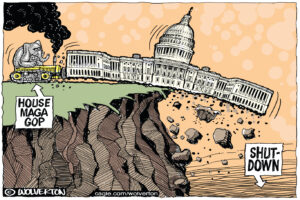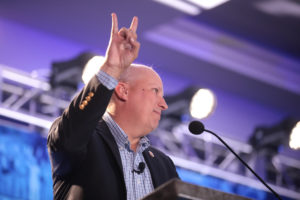The Promised Land
Imagine a place where the leading politician pokes fun at those who "regard all taxes as a pestilence, a plague or a disease." Imagine the same politician saying: "Not one of us wants to pay more in taxes. But you know what we want even less? What we want even less is to leave our country to our kids in a worsened condition."WASHINGTON — Imagine a place where the leading politician pokes fun at those who “regard all taxes as a pestilence, a plague or a disease.”
Imagine the same politician saying: “Not one of us wants to pay more in taxes. But you know what we want even less? What we want even less is to leave our country to our kids in a worsened condition.”
And imagine a place where other politicians are grown-ups and decide that closing budget deficits requires a mix of tax increases and spending cuts.
The place in question is clearly not Washington, D.C. Facing a $1.7 billion budget deficit, Gov. Martin O’Malley — who offered the above observations in an interview — led the Maryland Legislature this week to approve $1.4 billion in taxes and $550 million in spending cuts. It’s been a long time since we’ve seen that kind of balance from the federal government.
At the same time, the Legislature extended health coverage to 100,000 of its citizens and approved new money for transportation, education and cleaning up the Chesapeake Bay.
You’d be laughed out of the state if you ever claimed that Annapolis, the capital, was home to model behavior, political purity or Solomonic wisdom.
The final budget package contains its share of questionable concessions to this group or that. The middle class bears more of the burden of the tax increases than O’Malley originally hoped. The income tax hike for those earning over $500,000 a year — the rate goes from 4.75 percent to 5.5 percent — is a modest step in the right direction.
Worse, long-term fiscal balance depends, in part, on $700 million in revenue that would pour in if voters approve a referendum next year placing 15,000 slot machines around the state.
The fact that O’Malley and the Legislature were willing to go as far as they did makes the proposal for slot machines all the more disappointing. The standard arguments about gambling are worth paying attention to, notably that gambling is a regressive tax because the less well-off engage in it more, and that casinos and betting parlors often bring with them various forms of corruption.
But there’s a larger problem with the habit among Democrats in many states to pay for programs with one form of gambling or another. It shows they lack faith in their capacity to make the case for what government does. Politicians thus resort to gimmicks rather than face the full cost of services voters contend they want.
O’Malley is persuasive in arguing that what government does in areas such as education and the environment stands as evidence that citizens are “willing to invest and sacrifice in their own day to make their kids’ lives better.” Playing the slots doesn’t exactly meet that lofty standard.
Nonetheless, the sound you are hearing not only in Maryland but in state capitals across the nation is the crashing and crumbling of ideology, specifically a right-wing ideology that demonizes taxes and government while preaching that the public interest depends upon solicitude toward the comfortable and the privileged.
Those rebelling against this dying disposition include not only liberals such as O’Malley, but also moderates such as Govs. Janet Napolitano of Arizona and Kathleen Sebelius of Kansas, both Democrats, and Republican Arnold Schwarzenegger of California.
In sorting out his state’s budget mess, O’Malley turned for advice to Sebelius and former Virginia Gov. Mark Warner, a Democrat who once persuaded a Republican Legislature to raise taxes.
Warner, O’Malley said, urged him to take his time to explain the options so voters understood “what the choices are.” O’Malley’s initial budget was thus not adventurous. Both Warner and Sebelius also said requests for new taxes needed to be connected to services voters wanted government to deliver. “It’s important that you remind people what their state government does and where their taxes go,” O’Malley said.
This sounds like textbook stuff, but that’s the point: Liberals and moderates aren’t proposing exotic programs cooked up in social science laboratories far removed from real life. They’re simply suggesting that government sometimes has to do more to deal with basic problems.
“Eighty-five percent of our state budget in Maryland goes to public education, health care or public safety,” O’Malley says. That’s hardly the stuff of utopian dreams. It happens to be what government has to do, and all the ideology in the world won’t pay for it.
E.J. Dionne’s e-mail address is postchat(at)aol.com
© 2007, Washington Post Writers Group
Your support matters…Independent journalism is under threat and overshadowed by heavily funded mainstream media.
You can help level the playing field. Become a member.
Your tax-deductible contribution keeps us digging beneath the headlines to give you thought-provoking, investigative reporting and analysis that unearths what's really happening- without compromise.
Give today to support our courageous, independent journalists.






You need to be a supporter to comment.
There are currently no responses to this article.
Be the first to respond.